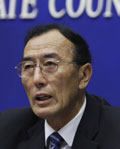My previous post elicited some of the peculiar tones of international journalism--by necessity, because of China's iron-fisted censorship--covering "what has happened"; but here I would just like to point out two jarring case studies of direct media censorship & propaganda, currently being carried out by the state of China, that can be directly observed and experienced by anyone this moment, thanks to our new-media technological era. In essence, China's censorship and propoganda reach extends to you and me, whether we are in New York, Miami, San Francisco, Nashville, or London.
***
1) This morning I saw this news article: "Tibet chairman: Police exercised 'great restraint'". It starts off,
Police showed great restraint and used no lethal force in dealing with the riots in Lhasa last Friday, the chairman of the Tibet autonomous regional government said yesterday."The riots caused heavy loss of life and property, and seriously disturbed social order," Qiangba Puncog told a news briefing in Beijing.
Qiangba PuncogThirteen innocent civilians were burned or stabbed to death, he said, adding that calm had returned to Lhasa.
On Friday, violence involving physical assault, destruction of property, looting and arson broke out in urban Lhasa. Rioters set fires at more than 300 locations, including 214 homes and shops, and smashed and burned 56 vehicles.
In one case, a civilian was doused with gasoline and burned to death by rioters.
Sixty-one members of the armed police were injured, including six critically. Rioters beat a police officer into a coma and cut a fist-size piece of flesh out of his buttock, he said.
Yet "public security personnel and police showed maximum restraint during law enforcement" and "throughout the process, (security forces) did not carry or use any destructive weapons. Only tear gas and water cannons were employed," Qiangba Puncog said...
Have you ever heard of the China Daily? I hadn't, and hadn't ever come across it before, but wow, at first I was confused at the paraphrase as the first sentence; then quotation; immediately followed by paraphrase, and truly so on and so forth till the end. And every single sentence and phrase from all sources vehemently condemned the rioters and praised the government. And then, in conformity, even every single one of the many links listed under "Related readings"..
Related readings:Government chief ensures safety in Tibet
Dalai's 'rule of terror' remarks refuted
Lhasa riot out of conspiracy
Religious leader, locals chide lawless riot in Lhasa
We fired no gunshots - Tibetan government chairman
Tibet separatists doomed to fail: Party chief
I thought for a second I was reading The Onion's satire, but very dark humor. I guess the scary thing is that this China Times article appeared as the 3rd down the list this morning (sitting here in front of my laptop in an apartment in New York) when I simply Googled the Tibet issue. But anyways I looked on Wikipedia what China Times is and it's (according to Wikipedia entry, at least) a CCP State-run paper, so that explains that; though troubling that it's the widest circulating English-newspaper in China..
Tibet News Blackout -***My site is still blocked (I am using an industrial-strength proxy if any on you need one, way stronger than Anonymous and much faster than Tor), and I was called about it yesterday by a "real media." You can find my quote buried in this article.
I've had CNN playing in the background the past few nights, and it's downright comical how often the screen just goes dark shortly after mention of the T word. Once again I ask my friends over at the ministry of propaganda if they sincerely believe with all their heart that this kind of ham-fisted tactic makes China look better, and if they sincerely believe it achieves their goal of keeping CNN viewers ignorant of what's happening in Tibet. If something ugly happens at the Olympic Games in August, are they just going to blackout the media broadcasts? And do they think they will be admired for it?
Conclusion of my own sense on all of this, the past few days...
This blogger of the popular blog, The Peking Duck, his name is Richard Burger, and incidentally the article that he was quoted in in Business Week, also had a few quotes and statements that really ring true to me.
Since riots broke out in Tibet last week, authorities have imposed martial law and tried to control the flow of information into and out of the region. The government has banned journalists and tourists from entering Tibet. And officials have imposed strict controls over the Internet in an effort to spin what happened in Tibet and neighboring provinces to conform with Beijing's version of events...And lastly, Rebecca Mackinnon, assistant professor at the University of Hong Kong's Journalism & Media Studies Center, is quoted as saying,
With the censoring of Chinese blog and BBC postings that do not reflect the government's position, most of the Chinese postings left standing tend to present an overwhelming resentful attitude towards Tibetans.
"There are a lot of people that think the Internet is going to bring information and democracy and pluralism in China just by existing. I think what we're seeing with this situation in Tibet is while the Chinese government's system of Internet censorship controls and propaganda is not infallible by any means, it works well enough in times of crisis like this."


No comments:
Post a Comment